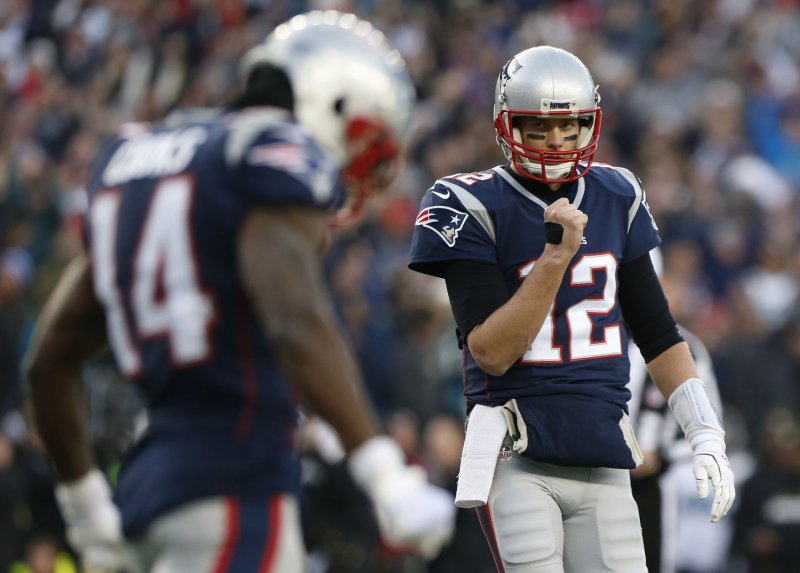New England Patriots quarterback Tom Brady pumps his fist after the Patriots scored on a short run against the Jacksonville Jaguars during the AFC Championship game Jan. 21. Photo by Matthew Healey/ UPI |
License Photo
BLOOMINGTON, Minn. -- For years, there was a little, informal debate raging over the greatest quarterback ever. Joe Montana? Otto Graham? Johnny Unitas? There were lots of opinions.
It is difficult to mount that argument anymore. Tom Brady, who will be starting his eighth Super Bowl on Sunday against Philadelphia, has pretty much usurped the discussion.
Naysayers will point to the big difference in the game today, where rules changes have made it easier to throw the ball and coaches, in constant communication with their quarterback, dictate every play into his headset.
So maybe Brady can't be Joe Cool like Montana and look into the stands before a Super Bowl-winning drive to point out John Candy to his teammates. Or maybe he can't dominate in two different leagues (and, remember, Graham had his plays relayed to him by Paul Brown's messenger guard system). And maybe he doesn't wear hightops like Unitas and call his own plays and redefine the position and win the greatest game ever played.
But in an era of parity, an era in which the rules are defined to prevent anyone from doing what Brady and the Patriots have done, his command almost defies belief.
The records are ridiculous and there's no need to go into them again here, other than to mention the guy has won way more games than any other quarterback in NFL history, has won more Super Bowls, more playoff games, thrown for more yards in the postseason, and orchestrated some of the greatest comebacks ever -- including overcoming a 25-point deficit in the third quarter of the Super Bowl just a year ago.
And now he's facing a Philadelphia team led by a backup quarterback, Nick Foles, and you have to wonder if it's even a fair fight.
Actually, it is.
Backup quarterbacks have won the Super Bowl far more often than most people might think, including a backup quarterback named Brady in the 2001 season. Nine times, in fact. Defining a backup quarterback as one who did not begin the year or entered training camp as the starter, Brady in Super Bowl XXXVI was the most recent to pull off the feat.
The first was Earl Morrall in Super Bowl V, after Unitas was knocked out in the second quarter against Dallas with bruised ribs. The list of other quarterbacks who became Super Bowl winners after beginning the year as a backup includes some familiar -- and some surprising -- names: Kurt Warner, Jim Plunkett, Doug Williams, Jeff Hostetler, Trent Dilfer, Roger Staubach and Terry Bradshaw.
Yes, Staubach won his first Super Bowl after replacing Craig Morton as a starter at mid-season, and Bradshaw won his first even after Joe Gilliam began the year as the Steelers' starter.
Which brings us around to Foles, who epitomizes the term "journeyman," even though he is only 29 years old. After a brilliant sophomore season in 2013 -- 27 touchdown passes, two interceptions -- he fell into disfavor with Chip Kelly, then the Eagles' head coach who took over for Andy Reid, and drifted off to St. Louis and then Kansas City before returning to Philadelphia for the 2017 season.
Head coach Doug Pederson, himself a one-time journeyman backup quarterback, put together a brilliant game plan for Foles in the NFC title game against Minnesota. Now the question is whether he can do the same against a team whose head coach, Bill Belichick, is known to feast on inexperienced quarterbacks, especially when given two weeks to prepare for the game.
A month ago, hardly anyone outside Philadelphia expected the Eagles to be in this spot. Experts thought the season over for them once Carson Wentz was lost to injury, because Foles had done nothing since his breakout season in 2013 to make anybody think he was capable of what he did the last few weeks.
In fact, at one time even Foles didn't think himself capable. He had succeeded only under Reid who he said "got out of me more than I ever thought possible," and he was on the verge of retirement at a young age.
There is no textbook for a coach bringing a backup quarterback onto this big stage, but Pederson may be the ideal coach because of his own background as a backup. The big question is how Foles will deal with whatever Belichick prepares for him. And New England's defense ranked 29th in the league this season, which means the Patriots are trying to become the worst defensive team to win the Super Bowl.
Philadelphia, meanwhile, has a strong defense. The Eagles allowed the fewest rushing yards in the league, and will try to make the Patriots' offense one-dimensional. That can be dangerous with a thrower like Brady, but the Eagles also have a strong pass rush.
For Brady, meanwhile, the Super Bowl stage is just one more step on the road to Canton and the Hall of Fame. There is hardly room for another line in his list of accomplishments, but by beating Philadelphia, he would add this one: First quarterback to lead the league in passing yardage and win the Super Bowl the same season.
And one other thing about Brady: All of the statistics, the numbers, the analysis, don't mean a darn thing. From the time the guy first entered the lineup to today, he has proved impervious to normal analysis. No reason to think this will be any different.
Ira Miller is an award-winning sportswriter who has covered the National Football League for more than five decades and is a member of the Pro Football Hall of Fame Selection Committee. He is a national columnist for The Sports Xchange.















